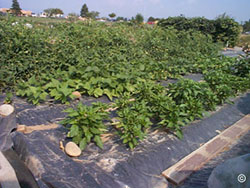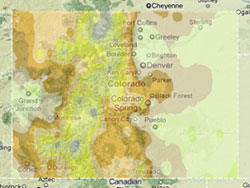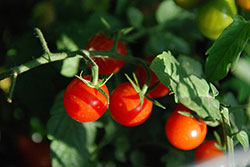What is a warm season vegetable?
Beans, corn, cucumbers, melons, okra, eggplant, peppers, tomatoes, pumpkin and squash are warm-season vegetables. Many of these crops grow under cool conditions, but won’t produce fruit when night temperatures are in the 50 degree Fahrenheit range. They need warm temperatures to grow and mature. Once the fruit begins to form, it needs up to two months of frost-free weather. Warm-season vegetables are not suited for high elevation gardens.
Where should I plant warm season vegetables?

Plant warm season vegetables in rich garden soil that gets plenty of sunlight and drains well. Work the soil early in the spring, adding one and one-half inches of organic material. Too much nitrogen promotes leaf growth but delays flower and fruit production, so choose organic material carefully.
Should I do something to warm the soil?
To help warm the soil, cover rows with black plastic mulch early in the season. Seeds can be planted through plastic mulch or directly in garden soil, depending on the local weather and recommendations for individual vegetables. Check the seed packet for the number of days until maturity so that there will be enough time for plants to grow before the first killing frost.
Do I need to treat transplant differently?

Transplants are plants started indoors or in greenhouses to get an early start on the growing season. Hardened transplants can be planted through plastic mulch or directly in soil anytime after the last average frost date. In Denver, the last frost is around May 10; in Fort Collins, the average date of last frost is May 15; and in Grand Junction, planting is safe on May 1. Colorado’s climate is different each year so careful attention to the current year’s local weather conditions is extremely important.
How can I protect seedlings from the cold?
Protect seedlings from frost and cold air by using hot caps or other insulation methods that use water to hold the sun’s heat. This protection can add up to two weeks to the gardening season.
How much should I water plants?
Keep plants watered but not too wet. Remove weeds quickly so they don’t compete with vegetable plants, and check plants regularly for insects and disease.
When should I harvest warm season vegetables?

Harvest warm-season vegetables as soon as they are ripe so the plants will produce more crops. Cucumbers, especially, will stop growing fruit until the ripe cucumbers are removed.
As the season draws to a close, cover the plants on cold, frosty nights. If a snow storm or hard freeze is predicted, harvest all vegetables of a reasonable size.
For “Organic Soil Amendments” listen to message number 1604.
For more information, see the following Colorado State University Extension fact sheet(s).
- Mulches for Home Grounds
- Vegetable garden: Soil Management and Fertilization
- Choosing a Soil Amendment
- Cucumbers, Pumpkins, Squash and Melons
- Vegetable garden: Soil Management and Fertilization
- Peppers and Eggplant



